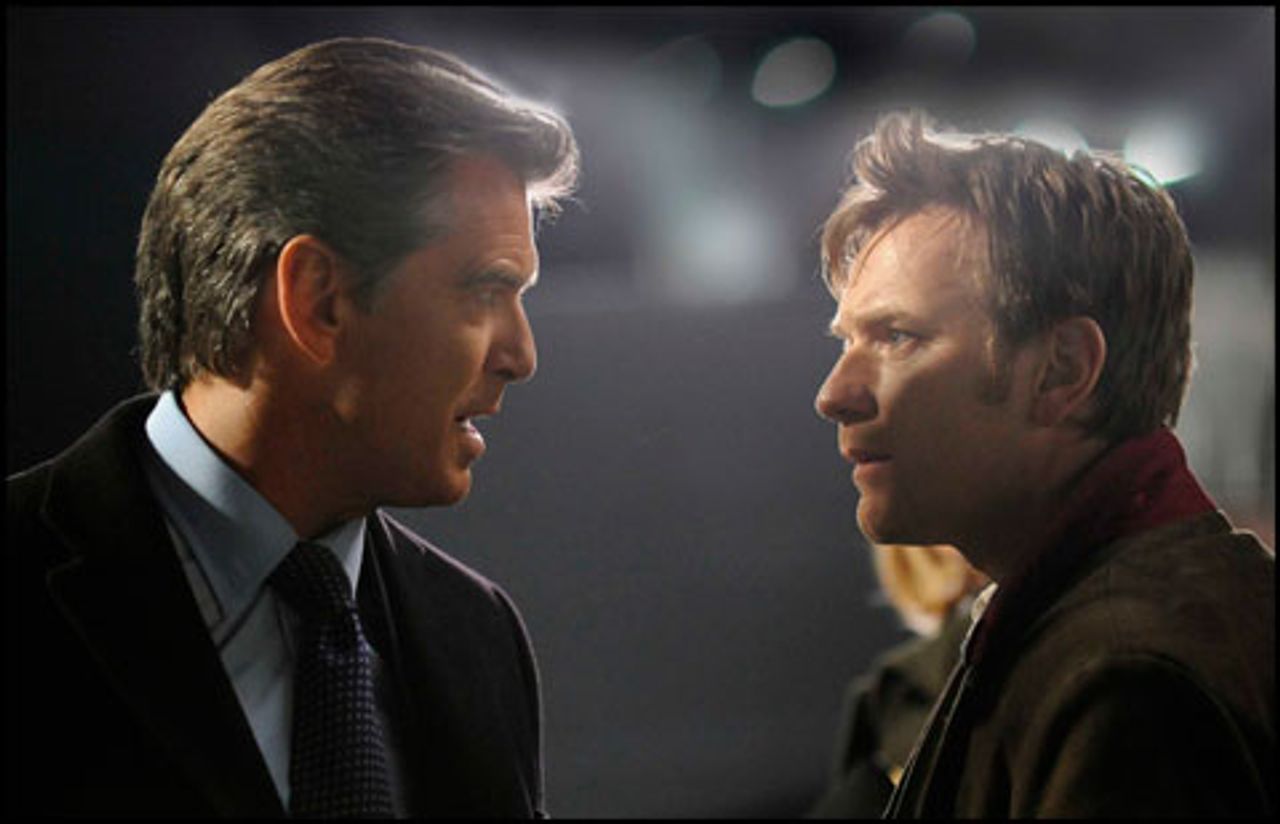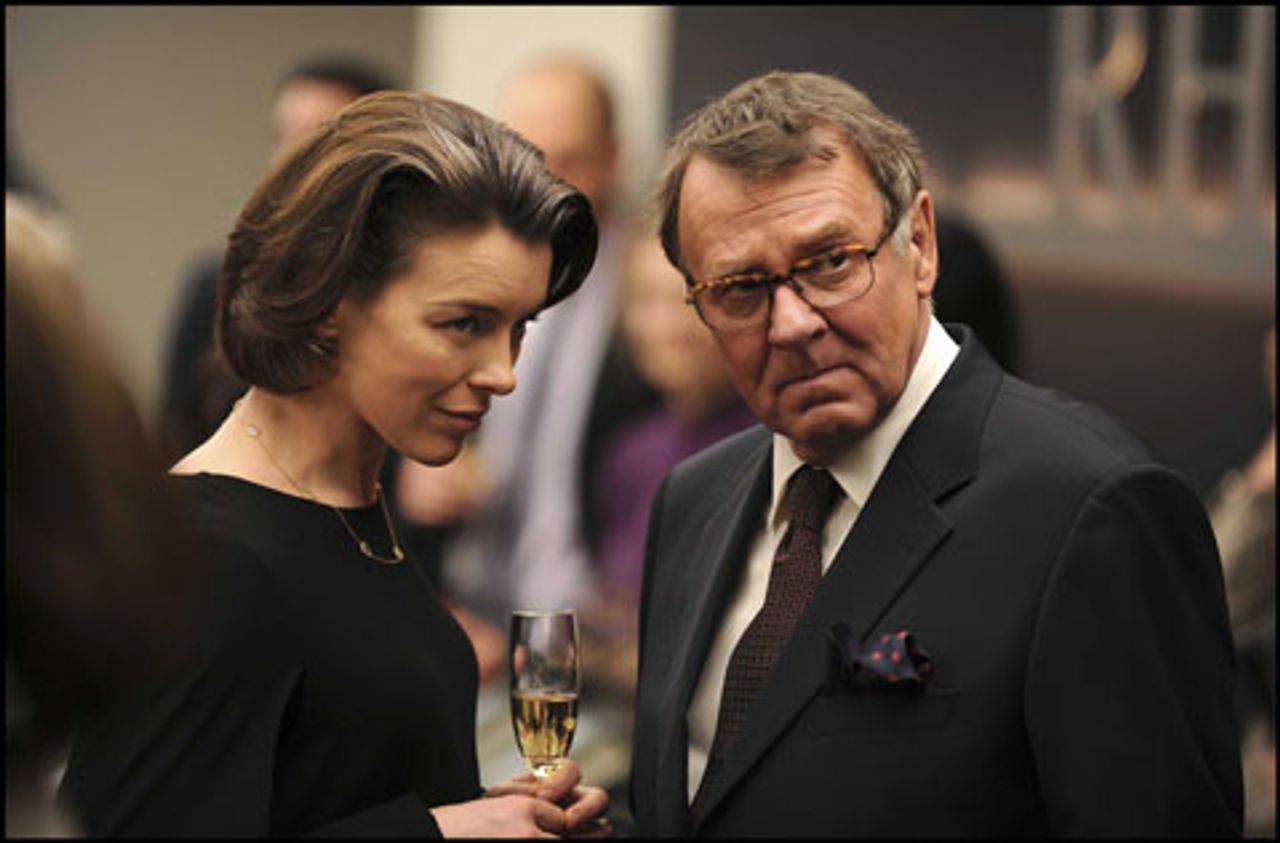Interviewer: You were telling me that London for you in the ’60s wasn’t just the happiest moment in your life, it was the happiest moment for the world.
Polanski: I think so. Definitely. It was a time of great aspirations and hopes and joy in general.
Interviewer: You don’t see any of that in the world now?
Polanski: I see the contrary, really. —2009, Interview magazine
The WSWS has already taken note of Roman Polanski’s The Ghost Writer, in conjunction with its screening at the Berlin International Film Festival, where the Polish-born director won an award as Best Director. The film’s release in North America provides the justification for a further comment.
The Ghost Writer centers on a nameless British writer (Ewan McGregor) who makes his living writing other people’s “autobiographies.” He is hired by a major US publishing firm to work up the memoirs of a former British prime minister, Adam Lang (Pierce Brosnan), a character obviously intended to bring Tony Blair to mind.
 Pierce Brosnan and Ewan McGregor in The Ghost Writer
Pierce Brosnan and Ewan McGregor in The Ghost WriterThe ghost writer’s predecessor has committed suicide. The writer travels to wintry, nearly deserted Martha’s Vineyard, an island off the coast of Massachusetts, where Lang, his wife, Ruth (Olivia Williams), and his assistant and mistress, Amelia Bly (Kim Cattrall), are installed at the billionaire publisher’s summer house.
Tension in the house is already great when the writer arrives, and it rises to new levels when television news reports announce that Lang may be indicted by the International Criminal Court for his role in Iraq war crimes, with the full support of Lang’s former foreign minister. Lang may well find himself effectively exiled in the US, one of the few countries that fails to recognize the court’s jurisdiction.
The writer ploughs on with his revising, but various troubling questions arise. Under what circumstances did his predecessor die? What is the significance of Lang’s falsification of his own political history? When the writer follows a trail that leads to a little-known, but powerfully connected American academic, he finds his own life in danger.
War crimes, CIA machinations, political assassination and conspiracy…these are The Ghost Writer’s materials.
Polanski has directed with his usual concise artistry. The film is both eerie and inquisitive from the outset. The image of an abandoned automobile on a ferry is disturbing. How is such a thing possible? What happened to the driver? Away we go.…
By this time, Polanski knows where to place his camera to create a dramatic and psychological effect, how long to hold a shot, how to direct his actors. He is one the few “classically trained” directors presently at work.
The score, by Alexandre Desplat, is unsettling, but musical and appealing, reminiscent at times of Bernard Herrmann’s work for Alfred Hitchcock (there are other Hitchcock-like touches in the film). The cinematography, by Pawel Edelman, catches at the bleakness of the setting and, more importantly, the events.
The performers are excellent. McGregor has done too many bad films, after a promising beginning, but The Ghost Writer reminds us what an unassuming, amusing and intense actor he is. Olivia Williams is generally very, very good, and here she does a distraught, bitter, occasionally charismatic politician’s wife—probably more charismatic than any actual contemporary politician’s wife—with great skill. Brosnan, who has appeared in numerous silly movies, including the Bond series, is also fine, as the glad-handing, cynical, not terribly bright or substantial former “world leader.”
 Olivia Williams and Tom Wilkinson in The Ghost Writer
Olivia Williams and Tom Wilkinson in The Ghost WriterTom Wilkinson, as the sinister academic, strikes all the proper notes: the intellectual as right-wing thug, confident that his “disinterested” pronouncements on world affairs will be backed by brute force.
It must be said there are numerous unusual circumstances surrounding Polanski’s new film. In the first place, the filmmaker apparently finished post-production work while in a Swiss prison and later under house arrest at his ski chalet in Gstaad. The Polish-born director remains in Switzerland while various legal proceedings unfold.
In mid-February, the Swiss justice ministry’s deputy director explained that US authorities’ efforts to extradite Polanski were on indefinite hold, as far as his government was concerned, while the filmmaker’s lawyers pursue the effort to have him sentenced in California in absentia (presumably for time already served more than 30 years ago).
The course of Polanski’s own life has been bound up with the twists and turns, often tragic, of modern history. That remains the case: the attempt to return him to the US for some sort of scandalous show trial is a political campaign, in which prosecutors and media are appealing to the basest sentiments in the population. The Swiss, for their part, arrested Polanski to distract attention from banking scandals and win friends in Washington.
The novel on which The Ghost Writer is based—The Ghost (2007)—and its author, Robert Harris, carry with them their own peculiar features. Harris (born 1957 in Nottingham), a former journalist and BBC television reporter, turned to non-fiction writing in 1982, authoring a number of books on contemporary politics and politicians, and to historical fiction in 1992, when his Fatherland—an alternate history of the modern world, in which Germany had won World War II—was published in 1992. He has written a number of novels about ancient Rome.
Harris was initially an enthusiastic supporter of Tony Blair and New Labour. Indeed, the Observer noted, “At the 1997 election, Harris covered the country in Blair’s private aircraft and sat with him in his constituency as the results came in.” His eventual disillusionment with Blair, which began in earnest over the firing of cabinet minister (and Harris’s friend) Peter Mandelson in 2001 and culminated with Blair’s decision to participate in the Iraq War, led to a serious falling out. Harris considers Britain’s role in Iraq a major policy blunder, and generally criticizes New Labour from the point of view of its subservience to Washington.
This helps explain the political limitations of the novel and the film. While the portrayal of Lang-Blair and his wife as personalities is quite scathing—the pair are selfish, vindictive, opportunist to the core—many larger issues are passed over. As Stefan Steinberg observed in the WSWS, “Harris’s novel and script reduce the complexities of the British government’s involvement in the Iraq war and its post-Second World War subservience to the US to a CIA conspiracy.” Iraq’s vast oil reserves never come in for a mention, much less any other world-historical, geopolitical concerns.
The novel’s attitude toward the Iraq war, although it clearly deplores the criminal methods employed, including torture, is more anti-American than anti-imperialist. If only Britons could run their own foreign policy…! As though the British at the height of their imperial power hadn’t pioneered in the field of colonial savagery and oppression, and weren’t still capable of it.
Harris is an adequate novelist. The Ghost rises above the level of a potboiler primarily, one suspects, by virtue of the author’s genuine revulsion over events in Iraq and the role of the Blair government. Its language and imagery are not rich. Harris relies far too much on cheap metaphors and similes. These are typical passages:
“New England is basically Old England on steroids—wider roads, bigger woods, larger spaces; even the sky seemed huge and glossy.” (This is not merely superficial, it’s quite wrong and misleading.)
Speaking of his laptop (and the previous ghostwriting accomplished on it), the ghostwriter-narrator declares, “We had endured rock stars who believed themselves messiahs with a mission to save the planet, We had survived footballers whose monosyllabic grunts would make a silverback gorilla sound as if he were Shakespeare.” (This is simply bad, awkward writing.)
A confirmed anti-communist, Harris disgraced himself recently by praising Robert Service’s miserable biography of Trotsky for the Sunday Times. Harris wrote, with apparent approval: “Now, 50 years after the last full-scale biography of Trotsky in English, Robert Service has turned his attention to this myth—and has, effectively, assassinated Trotsky all over again.”
Polanski’s film, on which Harris collaborated as co-screenwriter, is superior to the novel. It is possible to make a remarkable film out of a less than remarkable book. The various artistic decisions and excisions improve the final work, eliminating most of the extraneous episodes or settings. Polanski (and possibly Harris) has reduced the dimensions of the original work, made it more claustrophobic, more concrete, more intimate. Polanski takes life seriously, and he trains his performers’ attention on the most important actions and gestures. A rather generic thriller is given quite specific embodiment here.
Polanski’s own distaste for the American authorities (and authorities generally) no doubt entered into his decision to adapt The Ghost, but there is also something deeply felt in the work about the current human situation. As the comment cited at the beginning of this piece indicates, Polanski believes strongly that there is a lack of “great aspirations and hopes and joy in general” in the present period.
The physical conditions set the mood: rain, wind, cold, grey, deserted locales. The opposite of the seashore in summer: relaxed and sunny, where people talk and laugh and swim. Mistrust, friction, lies, and threats of brutal violence reign. Moments of humor and physical contact have to be snatched at, and ulterior motives may lie behind the most elementary acts.
Polanski’s view of the present is one-sided. However, despite that, The Ghost Writer is not a cynical work. It is swift-moving, entertaining, observant. McGregor’s writer, somewhat more of a glib, self-serving mercenary in the novel, gains our attention and even affection. He is not so terribly different from a great many people, including perhaps Polanski, and the spectator as well perhaps, capable of serious misjudgments, but well-meaning, curious about things, alert to serious injustice, and, in the end, hostile (and a threat) to the powers that be.
